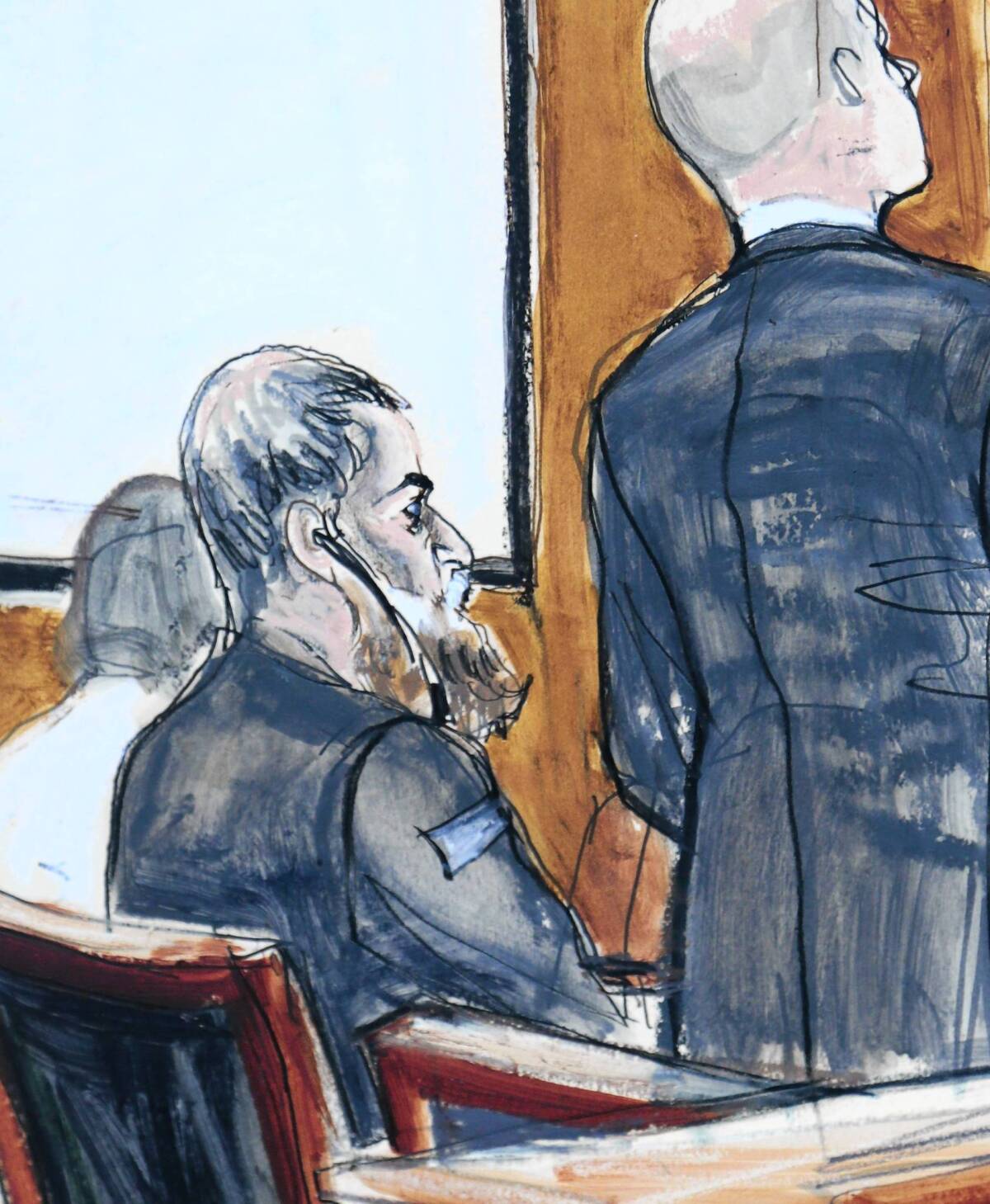Libyan accused in 1998 embassy bombings pleads not guilty

- Share via
NEW YORK — A Libyan accused of helping Al Qaeda orchestrate the bombings of U.S. embassies in Africa in 1998 pleaded not guilty to terrorism charges Tuesday, his first appearance in a case highlighting the Obama administration’s push to use civilian courts rather than the Guantanamo Bay military prison and drone strikes to nail high-profile terrorism suspects.
The defendant, Abu Anas al Liby, whose real name is Nazih Abdul-Hamed Ruqai, entered the courtroom in Manhattan looking far more gaunt than he did in the “wanted” picture circulated by the FBI after his indictment 13 years ago.
With sunken eyes, hollow cheeks and a bushy gray and red beard, he appeared older than his 49 years. Ruqai wore baggy gray sweat pants, a long-sleeved black shirt and black flip-flops and socks. His hands were cuffed behind his back, but they were released during the brief arraignment, in which he asked the court to refer to him as Ruqai rather than his nom de guerre.
Ruqai arrived in New York over the weekend after being questioned for several days on a U.S. Navy ship in the Mediterranean following his Oct. 5 arrest in the Libyan capital, Tripoli. U.S. forces carried out the surprise raid that resulted in the capture of Ruqai, one of more than 20 people accused of working with Al Qaeda to carry out the bombings at the embassies in Nairobi, Kenya, and Dar es Salaam, Tanzania, in August 1998.
The charges against him include conspiracy to kill U.S. citizens and conspiracy to destroy U.S. property. A 150-page indictment naming Ruqai and others accused in the bombings alleges that beginning in late 1993, Ruqai was involved in discussions with Al Qaeda members about attacking the embassies in retaliation for U.S. military action in Somalia. The indictment says he “conducted visual and photographic surveillance” of the Nairobi embassy compound the same year.
Twelve Americans were among the 224 killed in the attacks. Of those named in the original indictment, nine have died or been killed in Pakistan, Afghanistan or Somalia, including Al Qaeda leader Osama bin Laden. Six are serving life sentences in U.S. prisons. Several remain at large.
Ruqai’s court-appointed attorney, David Patton, said after the hearing that the indictment only mentioned Ruqai “in a mere three paragraphs” relating to conduct in 1993 and 1994.
“The allegation is that he met with Al Qaeda members about a possible bombing of the American Embassy in Nairobi, Kenya, that ended up taking place five years later in 1998. There is no allegation that he had any connection to Al Qaeda after 1994,” Patton said.
Ruqai’s family has said he suffers from hepatitis C and has had nothing to do with Al Qaeda since the mid-1990s.
But Assistant U.S. Atty. Nicholas Lewin described Ruqai as “a clear danger to the community.”
The last defendant charged in the U.S. Embassy attacks to face trial in civilian court, Ahmed Khalfan Ghailani, was acquitted of the most serious charges, including murder. He was convicted of conspiring to destroy U.S. property and sentenced in 2011 to life in prison.
Like Ruqai, Ghailani was captured overseas by U.S. forces and questioned without a lawyer, off American soil, before being brought to the U.S. and handed to the criminal justice system for trial. Much of what he revealed during the initial interrogation could not be used in court because it occurred before he was read his rights or appointed an attorney.
Whereas Ghailani was held for five years, Ruqai was interrogated for less than two weeks on a ship in international waters before being turned over for trial.
Critics of President Obama’s plan to close the Guantanamo Bay, Cuba, military prison and use civilian courts to try high-profile terrorism suspects opposed Ruqai’s relatively swift transfer out of military custody, saying that if he had been held longer and subjected to interrogation without legal representation, he would have revealed more valuable secrets.
“Put it this way: Now he decides whether he will talk,” said Rep. Peter T. King (R-N.Y.), a member of the House Intelligence Committee, the Associated Press reported.
Ruqai’s next court appearance was scheduled for Oct. 22.
More to Read
Sign up for Essential California
The most important California stories and recommendations in your inbox every morning.
You may occasionally receive promotional content from the Los Angeles Times.














